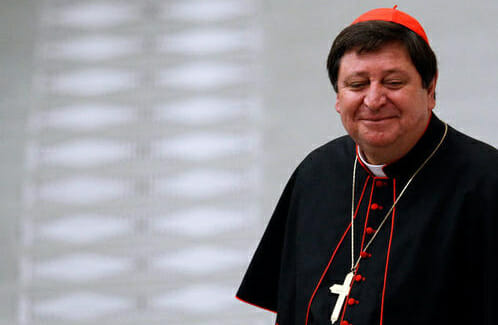
Oct 25, 2015 | Non categorizzato
 “It was the Son of God, Jesus Christ who revealed to us the true image of God and the true image of man and woman. God is Father, Son and Holy Spirit. We are, therefore, not dealing with three gods but one God in three Persons, as lengthily described in the doctrine of the Trinity. The Church has deepened and preserved this doctrine in all its integrity throughout the centuries. Besides finding the correct language in its profession of faith, the Church has always adored the Three Divine Persons. Up to the present, the spiritual Trinitarian doctrine has shown us the deep relationship the disciples of Jesus had with each of these Three Divine Persons. The Word of God does not present God only as a perfect Spirit, creator of heaven and earth, (as declared in the Christian Doctrine’s Second Catechism), but affirms that “God is love” (1 John 4,8.16). Saint Augustine tried to delve deeper into the path of love in God and reached the point of affirming that God is the Lover, the Beloved, and Love itself. However, he felt incapable of pursuing this path and bequeathed to us the deepening of this mystery in man and woman, in the three qualities of intelligence, memory and will. But what remained to be fully developed was the deeper understanding of the mystery of God who is Love. In our time, in which culture affirms the individual up to the point of falling into an exasperated individualism, and we struggle to make the synthesis between unity and diversity in the human relationships in this globalised world where human relationships are still re-evaluated in all senses, it would be opportune to seek in the Holy Trinity, that essentially Christian foundation, the path towards the fulfillment of love as a human identity. What is love? How can we understand and experience love? Our pathway must be found in the pathway of He who came to us from the womb of the Father, that is, the Son. To meet man, God who is love made himself nothing (Nazareth, Maria, Joseph, Bethlehem, the flight to Egypt. The Cross) (cfr text of Paul to the Philppians 2,5-11). Love passes through the incarnation and the mystery of the resurrection. Love makes itself nothing to be able to meet the other. This is the Kenotic dimension of love. Without this path it would be difficult for man and woman to find that relationship with God, but also with each other, whether man or woman. In this sense I think we could find the Trinitarian path of anthropology, not only theoretically but concretely.”
“It was the Son of God, Jesus Christ who revealed to us the true image of God and the true image of man and woman. God is Father, Son and Holy Spirit. We are, therefore, not dealing with three gods but one God in three Persons, as lengthily described in the doctrine of the Trinity. The Church has deepened and preserved this doctrine in all its integrity throughout the centuries. Besides finding the correct language in its profession of faith, the Church has always adored the Three Divine Persons. Up to the present, the spiritual Trinitarian doctrine has shown us the deep relationship the disciples of Jesus had with each of these Three Divine Persons. The Word of God does not present God only as a perfect Spirit, creator of heaven and earth, (as declared in the Christian Doctrine’s Second Catechism), but affirms that “God is love” (1 John 4,8.16). Saint Augustine tried to delve deeper into the path of love in God and reached the point of affirming that God is the Lover, the Beloved, and Love itself. However, he felt incapable of pursuing this path and bequeathed to us the deepening of this mystery in man and woman, in the three qualities of intelligence, memory and will. But what remained to be fully developed was the deeper understanding of the mystery of God who is Love. In our time, in which culture affirms the individual up to the point of falling into an exasperated individualism, and we struggle to make the synthesis between unity and diversity in the human relationships in this globalised world where human relationships are still re-evaluated in all senses, it would be opportune to seek in the Holy Trinity, that essentially Christian foundation, the path towards the fulfillment of love as a human identity. What is love? How can we understand and experience love? Our pathway must be found in the pathway of He who came to us from the womb of the Father, that is, the Son. To meet man, God who is love made himself nothing (Nazareth, Maria, Joseph, Bethlehem, the flight to Egypt. The Cross) (cfr text of Paul to the Philppians 2,5-11). Love passes through the incarnation and the mystery of the resurrection. Love makes itself nothing to be able to meet the other. This is the Kenotic dimension of love. Without this path it would be difficult for man and woman to find that relationship with God, but also with each other, whether man or woman. In this sense I think we could find the Trinitarian path of anthropology, not only theoretically but concretely.”

Oct 24, 2015 | Focolare Worldwide
 “We also felt the need to do something for all the poor families in our city. And we discovered that here in Teramo (Italy), the Caritas association runs an emporium where they collect basic goods for those in need. And so, with our parents, we visited this emporium and having discovered – to our great joy – that some bakers in the city donate not only the leftovers but also fresh bread, we decided to take eggs, jam, toilet paper, and refreshing tissues (since, as they said, they work like water). We filled up three trolleys with gifts!!! We all, kids and adults were all very happy, because we discovered a way of helping people who have nothing to eat. Now that we know about this special supermarket, we shall return and try to involve all our friends.” (The gen4 and gen3 boys and girls of Teramo, Italy)
“We also felt the need to do something for all the poor families in our city. And we discovered that here in Teramo (Italy), the Caritas association runs an emporium where they collect basic goods for those in need. And so, with our parents, we visited this emporium and having discovered – to our great joy – that some bakers in the city donate not only the leftovers but also fresh bread, we decided to take eggs, jam, toilet paper, and refreshing tissues (since, as they said, they work like water). We filled up three trolleys with gifts!!! We all, kids and adults were all very happy, because we discovered a way of helping people who have nothing to eat. Now that we know about this special supermarket, we shall return and try to involve all our friends.” (The gen4 and gen3 boys and girls of Teramo, Italy)
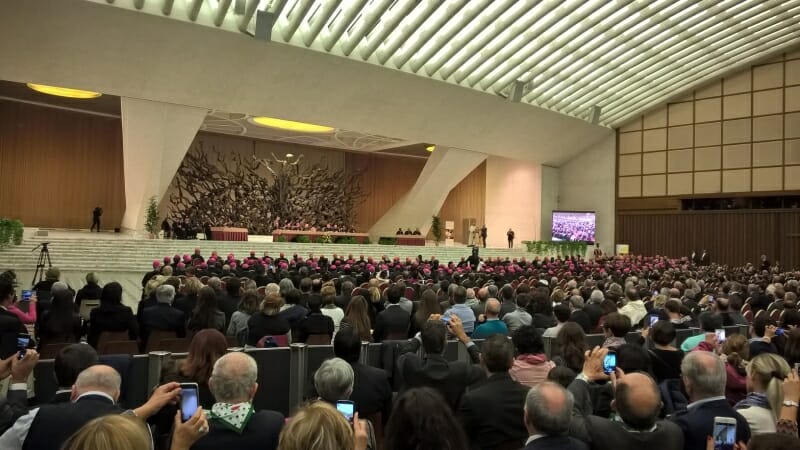
Oct 24, 2015 | Senza categoria
 It was a solemn celebration in the presence of all the synod Fathers, delegations, ambassadors and Pope Francis – who gave one of the most important speeches of his pontificate – on 17 October in the Nervi Hall, to commemorate 50 years since the institution of the Bishops’ Synod by Pope Paul VI. Focolare President, Maria Voce defined it, “a masterpiece”, when asked to comment on the spur of the moment, on the Pope’s speech. “He illustrated that there cannot be a progress of the Church if not as a synodal body. I was struck when he underlined the importance of the sensus fidei, that is, the sense of faith, and the infallibility of the people of God, who together listen to the Holy Spirit, thus expressing the faith of the Church. And this starts always from the base. In this manner, with all the juridical collegiate figures that emerged after the Second Vatican Council – Pope Francis makes us see – that if we don’t live this synodal spirit, starting from the people it addresses, they will not serve to enhance communion. They would all be just masks.” And regarding the primacy of service: “Let us never forget this!” the Pope exclaimed. “For the disciples of Jesus, of the past, today and for always, the only authority is that of service, the sole power is the cross, in the Master’s words: ”’You know that the governors of the nations rule over them and the leaders oppress them. Among you it will not be so; whoever wishes to be great among you, will be your servant and whoever wants to be first among you, will be your slave’ (Mt 20,25-27). Among you it will not be so: in this expression we reach that very heart in which we have been trying for some time now to reflect ourselves, exactly in the sense which he explained: “the top is found below the base. Due to this, those who exert authority are called ‘ministers’ because, according to the original meaning of the word, they are the smallest among all.” What comes out once more in his speech is the same wavelength between Pope Francis and Patriarch Bartholomew I: “The commitment to build a synodal Church – a mission to which we are all called, each in the role the Lord entrusted us with – is burdened by ecumenical implications. Due to this, in speaking to a delegation of the Patriarchate of Costantinople, I recently stressed the conviction that ‘the careful examination of how the principle of synodality is expressed in the life of the church and the service of he who presides it, will offer an important contribution to the progress of relationships between our Churches.” Maria Voce also underlined, “It is a synergy – that not only regards the problems of creation expressed in the encyclical Laudato si’; it is precisely this feeling of synodality of the Church that pushes Pope Francis to open a door to say: we must get together as one. It is a responsibility that urges him to find a way of getting down to concrete steps towards a full communion among Christians, because only in this can the synodal spirit of the Church be seen.” Lastly, Maria Voce continued, “The effort is not to seek compromises, but that which the Holy Spirit wants to say to us, which is a challenge that requires a strong unity of the entire Church. We spoke with various participants of the Synod for Families in the past days, and also with the family of married focolarini from Colombia, María Angélica and Luis Rojas, and all asked us for prayers. So let us intensify our prayers as if we were there, trying to understand how to respond to the anguish and difficulties of the family in the modern world, and regard the family as part of God’s plan.” The motivation and strong words of Paul VI that accompanied the institution of the Synod of Bishops on 15 September 1965 are particularly important for the Focolare Movement, precisely because the institution of the Synod, Maria Voce explained, “brought a new climate within the Church, a turning point: that of collegiality, communion, passing from a manner of conducting the individual and rather hierarchical Church, to a collegial one. As the Focolare Movement, as a movement of unity, we thus could not but take this event into consideration, and with joy I accepted Cardinal Baldisseri’s invitation to participate in the commemoration.” The Synods, in fact, are the concrete prosecution of the Second Vatican Council: «Paul VI, evidently inspired by the Holy Spirit after having made such a beautiful experience of the council, which had stirred up new realities in the Church – just think of the documents Gaudium et Spes, Lumen Gentium, Nostra Aetate – felt that this experience had to continue.» “Synod,” in fact, precisely means “journey together” as Cardinal Schönborn explained in his speech on the birth of the Synod of Bishops and on the various Synods, with the force of the Pope. It thus means that «the Church is walking together, not the Pope by himself, the bishops by themselves, the people of God by themselves, or the laity by themselves: this journey is undertaken by the Church, in which all have something to say and give.” Read more: press release on the participation of the Focolare in the commemoration of the 50th anniversary of the Synod of Bishops.
It was a solemn celebration in the presence of all the synod Fathers, delegations, ambassadors and Pope Francis – who gave one of the most important speeches of his pontificate – on 17 October in the Nervi Hall, to commemorate 50 years since the institution of the Bishops’ Synod by Pope Paul VI. Focolare President, Maria Voce defined it, “a masterpiece”, when asked to comment on the spur of the moment, on the Pope’s speech. “He illustrated that there cannot be a progress of the Church if not as a synodal body. I was struck when he underlined the importance of the sensus fidei, that is, the sense of faith, and the infallibility of the people of God, who together listen to the Holy Spirit, thus expressing the faith of the Church. And this starts always from the base. In this manner, with all the juridical collegiate figures that emerged after the Second Vatican Council – Pope Francis makes us see – that if we don’t live this synodal spirit, starting from the people it addresses, they will not serve to enhance communion. They would all be just masks.” And regarding the primacy of service: “Let us never forget this!” the Pope exclaimed. “For the disciples of Jesus, of the past, today and for always, the only authority is that of service, the sole power is the cross, in the Master’s words: ”’You know that the governors of the nations rule over them and the leaders oppress them. Among you it will not be so; whoever wishes to be great among you, will be your servant and whoever wants to be first among you, will be your slave’ (Mt 20,25-27). Among you it will not be so: in this expression we reach that very heart in which we have been trying for some time now to reflect ourselves, exactly in the sense which he explained: “the top is found below the base. Due to this, those who exert authority are called ‘ministers’ because, according to the original meaning of the word, they are the smallest among all.” What comes out once more in his speech is the same wavelength between Pope Francis and Patriarch Bartholomew I: “The commitment to build a synodal Church – a mission to which we are all called, each in the role the Lord entrusted us with – is burdened by ecumenical implications. Due to this, in speaking to a delegation of the Patriarchate of Costantinople, I recently stressed the conviction that ‘the careful examination of how the principle of synodality is expressed in the life of the church and the service of he who presides it, will offer an important contribution to the progress of relationships between our Churches.” Maria Voce also underlined, “It is a synergy – that not only regards the problems of creation expressed in the encyclical Laudato si’; it is precisely this feeling of synodality of the Church that pushes Pope Francis to open a door to say: we must get together as one. It is a responsibility that urges him to find a way of getting down to concrete steps towards a full communion among Christians, because only in this can the synodal spirit of the Church be seen.” Lastly, Maria Voce continued, “The effort is not to seek compromises, but that which the Holy Spirit wants to say to us, which is a challenge that requires a strong unity of the entire Church. We spoke with various participants of the Synod for Families in the past days, and also with the family of married focolarini from Colombia, María Angélica and Luis Rojas, and all asked us for prayers. So let us intensify our prayers as if we were there, trying to understand how to respond to the anguish and difficulties of the family in the modern world, and regard the family as part of God’s plan.” The motivation and strong words of Paul VI that accompanied the institution of the Synod of Bishops on 15 September 1965 are particularly important for the Focolare Movement, precisely because the institution of the Synod, Maria Voce explained, “brought a new climate within the Church, a turning point: that of collegiality, communion, passing from a manner of conducting the individual and rather hierarchical Church, to a collegial one. As the Focolare Movement, as a movement of unity, we thus could not but take this event into consideration, and with joy I accepted Cardinal Baldisseri’s invitation to participate in the commemoration.” The Synods, in fact, are the concrete prosecution of the Second Vatican Council: «Paul VI, evidently inspired by the Holy Spirit after having made such a beautiful experience of the council, which had stirred up new realities in the Church – just think of the documents Gaudium et Spes, Lumen Gentium, Nostra Aetate – felt that this experience had to continue.» “Synod,” in fact, precisely means “journey together” as Cardinal Schönborn explained in his speech on the birth of the Synod of Bishops and on the various Synods, with the force of the Pope. It thus means that «the Church is walking together, not the Pope by himself, the bishops by themselves, the people of God by themselves, or the laity by themselves: this journey is undertaken by the Church, in which all have something to say and give.” Read more: press release on the participation of the Focolare in the commemoration of the 50th anniversary of the Synod of Bishops.
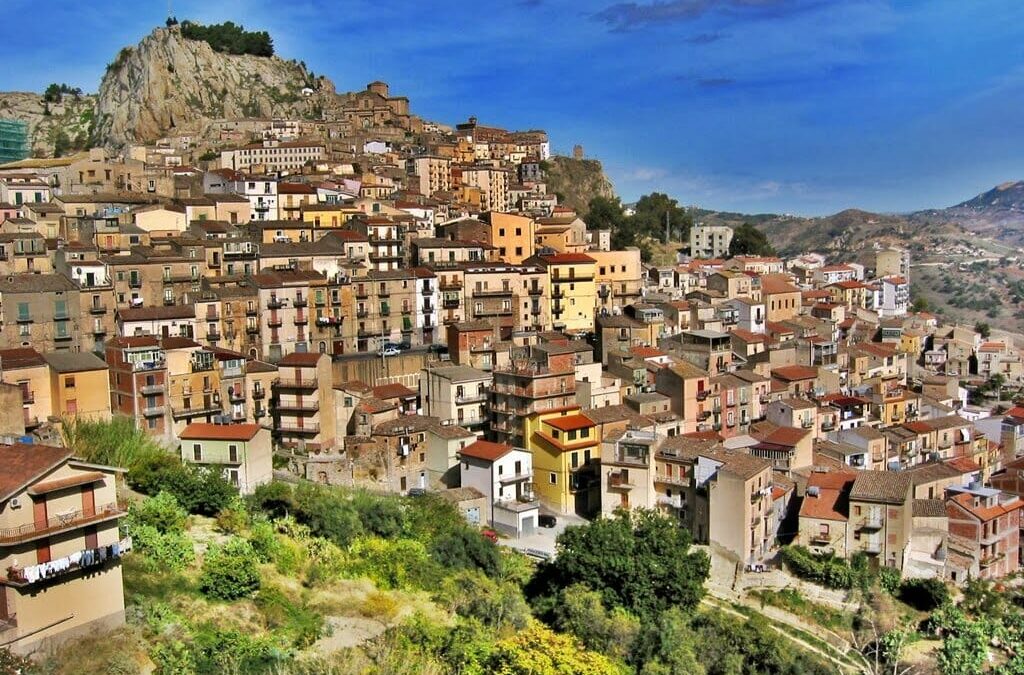
Oct 24, 2015 | Non categorizzato
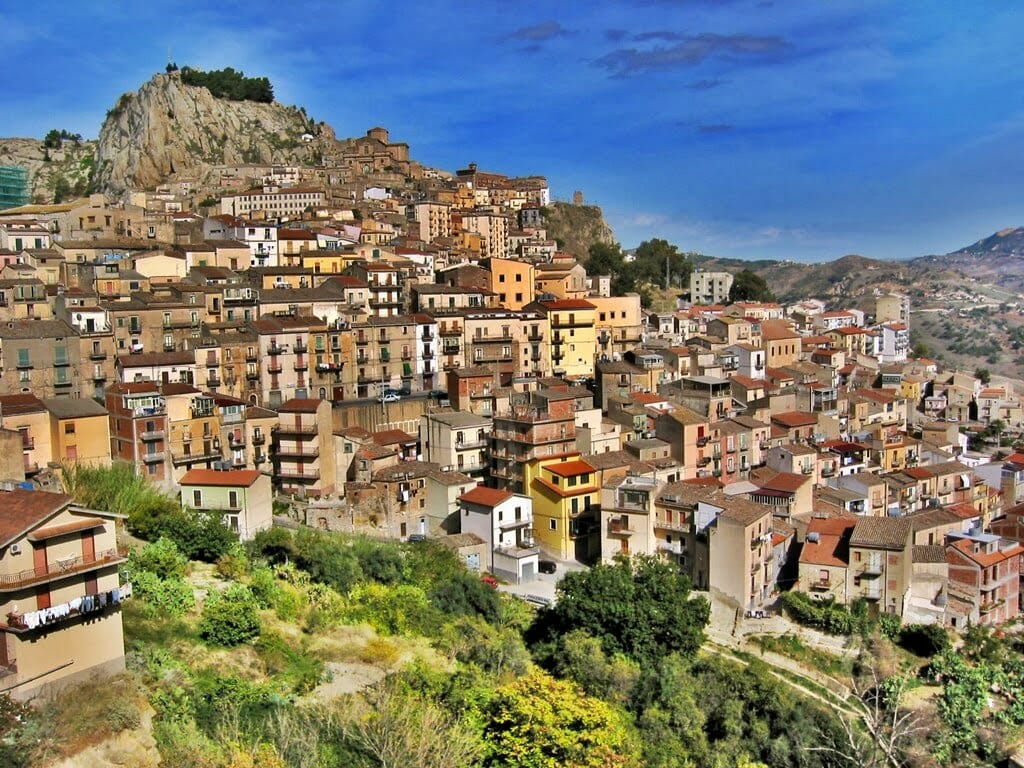 “I live in Nicosia and was born and grew up in an Orthodox family that was Christian in name only. There was no depth, no relationship with Jesus. Indeed, God was the ally of my parents, and they seemed to have a monopoly on Him when they wanted us to obey them. When I finished high school, I received a scholarship to study orthodontics in Hungary. It was difficult for me to get used to the new sitaution. For the first time I was far from my family, living with people I didn’t know. Back then, we were far from the multicultural spirit that prevails today. I was filled with prejudices, with an attitude of rejection. During that year I encountered many disappointments, also from my friends. Meanwhile, the deep search for a more authentic life had begun in me. At the new college I met a Hungarian girl. I had been struck by her cheerfulness and also the way she accepted others. She even offered to help me learn Hungarian. Disappointed by my previous experience with friends, her way of acting made me wonder: ‘Is she sincere, or only kidding?’ But . . . I began to trust her. We shared joys, sorrows, failures and also material things. When she went home to her family on the weekends, around 50 km from Budapest, she took me along so that I wouldn’t be missing my own family. Her family were farmers, very loving, warm and hospitable. But there was one question: Every day at the same hour, and one evening every week she would disappear without explanation. All I knew was that she was with other friends. It turns out that she was with several young women who belonged to the growing Focolare community in Hungary. Back then – when were under the Socialist Regime – anyone discovered belonging to a religious movement was persecuted with serious consequences, such as loss of one’s job, or place at university. One day she felt comfortable enough to confide in me. She told me how she had come to know the Focolare Movement. A priest from her village had recounted to her the story of Chiara Lubich, a young woman like us, of our same age, and how she had been struck by the fact that during the Second World War, Chiara saw everything crumbling around her and the only ideal that didn’t crumble under the bombs was God. She wanted God to be her ideal in life, and to live according to His will. She explained to me that she and those young women she met with were trying to do the same thing. They placed God first in their life, living the Word of Life each day, a sentence taken from the Gospel with an explanation by Chiara. Then they recounted their daily experiences to each other, as a gift for each other. Everything she told me touched me so deeply, I began reading the New Testament, which I had never done before, and this was a decisive moment for my future. Life began to change. All the people I met each day, I could no longer ignore them, nor judge them, nor undervalue them, because now a new mentality had been born in me: we’re all children of One Father and therefore brothers and sisters to each other. Every person is a candidate for the unity that Jesus asked of His Father: that all may be one: the good, the bad, the ugly, the unlikeable, the big and the small. . . The theology of the Fathers had been awakened in me, especically that saying of Saint John Chrysostom: ‘I see my brother, I see my God’. The walls of prejudice that I built up within me, began to crumble. I realised that the Gospel was not only something to be read out in church and that was it; rather, it could bring about a revolution if we took it seriously and translated it into daily life: at the university, at the factory, at the hospital, in the family! Amidst all of this enthusiasm and joy that was filling my life, there was one great sorrow: The other girls were all Catholics, and I was the only Orthodox. They attended Mass every day. I strongly desired to be with them in those moments, but they suggested that I look for my Orthodox Church in Budapest so that I could attend the Liturgy and receive the Eucharist. This separation was painful, but Chiara had invited the members of the Movement belonging to other Christian Churches, to love their Churches, just as she had loved hers. This explanation gave me peace and, once again, it confirmed in me the wisdom, love and descretion that Chiara possessed in front of the believers of different Churches. It could not have been anything but the fruit of God’s intervention in our times. I found the Orthodox parish and got to know it more. I went every Sunday and, with the permission of the priest was able to receive Holy Communion any time there was a Divine Liturgy. They never left me alone in this new initiative. The other young Catholic women often attended the Liturgy with me. The liturgical and sacramental life was no longer something formal or external, but a relationship that was building with Jesus, the activation of God’s grace in my heart that helped in the daily struggles and increased the fruits of love, joy and peace within me.” At Istanbul, March 14, 2015, on the occasion of the publication of the Greek editions of Chiara Lubich’s writings.
“I live in Nicosia and was born and grew up in an Orthodox family that was Christian in name only. There was no depth, no relationship with Jesus. Indeed, God was the ally of my parents, and they seemed to have a monopoly on Him when they wanted us to obey them. When I finished high school, I received a scholarship to study orthodontics in Hungary. It was difficult for me to get used to the new sitaution. For the first time I was far from my family, living with people I didn’t know. Back then, we were far from the multicultural spirit that prevails today. I was filled with prejudices, with an attitude of rejection. During that year I encountered many disappointments, also from my friends. Meanwhile, the deep search for a more authentic life had begun in me. At the new college I met a Hungarian girl. I had been struck by her cheerfulness and also the way she accepted others. She even offered to help me learn Hungarian. Disappointed by my previous experience with friends, her way of acting made me wonder: ‘Is she sincere, or only kidding?’ But . . . I began to trust her. We shared joys, sorrows, failures and also material things. When she went home to her family on the weekends, around 50 km from Budapest, she took me along so that I wouldn’t be missing my own family. Her family were farmers, very loving, warm and hospitable. But there was one question: Every day at the same hour, and one evening every week she would disappear without explanation. All I knew was that she was with other friends. It turns out that she was with several young women who belonged to the growing Focolare community in Hungary. Back then – when were under the Socialist Regime – anyone discovered belonging to a religious movement was persecuted with serious consequences, such as loss of one’s job, or place at university. One day she felt comfortable enough to confide in me. She told me how she had come to know the Focolare Movement. A priest from her village had recounted to her the story of Chiara Lubich, a young woman like us, of our same age, and how she had been struck by the fact that during the Second World War, Chiara saw everything crumbling around her and the only ideal that didn’t crumble under the bombs was God. She wanted God to be her ideal in life, and to live according to His will. She explained to me that she and those young women she met with were trying to do the same thing. They placed God first in their life, living the Word of Life each day, a sentence taken from the Gospel with an explanation by Chiara. Then they recounted their daily experiences to each other, as a gift for each other. Everything she told me touched me so deeply, I began reading the New Testament, which I had never done before, and this was a decisive moment for my future. Life began to change. All the people I met each day, I could no longer ignore them, nor judge them, nor undervalue them, because now a new mentality had been born in me: we’re all children of One Father and therefore brothers and sisters to each other. Every person is a candidate for the unity that Jesus asked of His Father: that all may be one: the good, the bad, the ugly, the unlikeable, the big and the small. . . The theology of the Fathers had been awakened in me, especically that saying of Saint John Chrysostom: ‘I see my brother, I see my God’. The walls of prejudice that I built up within me, began to crumble. I realised that the Gospel was not only something to be read out in church and that was it; rather, it could bring about a revolution if we took it seriously and translated it into daily life: at the university, at the factory, at the hospital, in the family! Amidst all of this enthusiasm and joy that was filling my life, there was one great sorrow: The other girls were all Catholics, and I was the only Orthodox. They attended Mass every day. I strongly desired to be with them in those moments, but they suggested that I look for my Orthodox Church in Budapest so that I could attend the Liturgy and receive the Eucharist. This separation was painful, but Chiara had invited the members of the Movement belonging to other Christian Churches, to love their Churches, just as she had loved hers. This explanation gave me peace and, once again, it confirmed in me the wisdom, love and descretion that Chiara possessed in front of the believers of different Churches. It could not have been anything but the fruit of God’s intervention in our times. I found the Orthodox parish and got to know it more. I went every Sunday and, with the permission of the priest was able to receive Holy Communion any time there was a Divine Liturgy. They never left me alone in this new initiative. The other young Catholic women often attended the Liturgy with me. The liturgical and sacramental life was no longer something formal or external, but a relationship that was building with Jesus, the activation of God’s grace in my heart that helped in the daily struggles and increased the fruits of love, joy and peace within me.” At Istanbul, March 14, 2015, on the occasion of the publication of the Greek editions of Chiara Lubich’s writings.
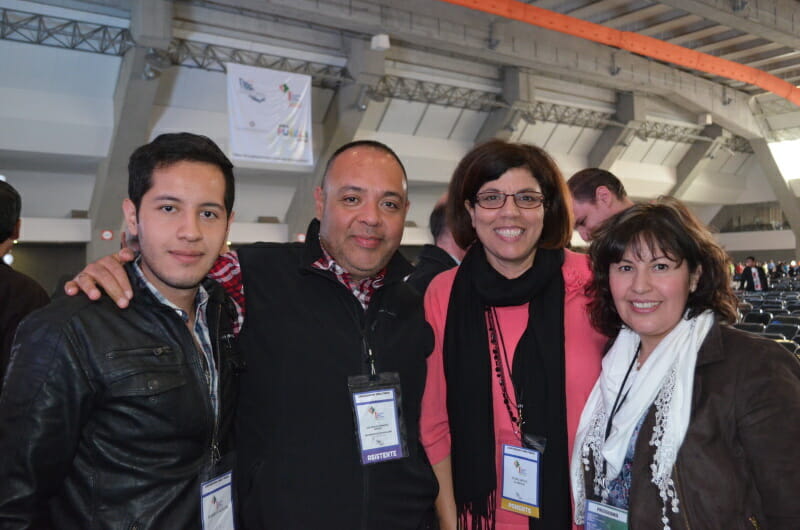
Oct 23, 2015 | Non categorizzato
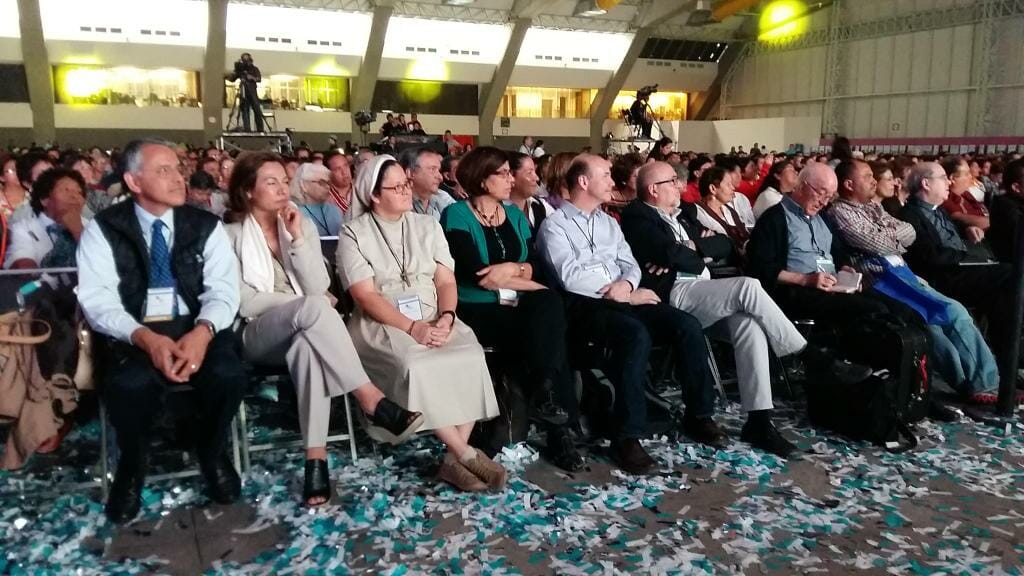 “It’s a historic event”; “There’s no turning back”; “Only through our communion will we solve the problems of Mexico.” These were some of the phrases that were joyfully echoing in the corridors of the Centro Expositor, an avant-garde but functional structure that adds to the already rich architectural patrimony of the city of Puebla. The slogan “Young people, family and life united in the joy of the New Evangelisation” was the backdrop of the three-day conference (October 16-18, 2015). Accompanying the reflections presented at the main assembly, there was also a series of reports and roundtables, with twenty simultaneous focus groups that strengthened awareness in the thousands of participants, of the important social role that comes with being part of a Church movement.
“It’s a historic event”; “There’s no turning back”; “Only through our communion will we solve the problems of Mexico.” These were some of the phrases that were joyfully echoing in the corridors of the Centro Expositor, an avant-garde but functional structure that adds to the already rich architectural patrimony of the city of Puebla. The slogan “Young people, family and life united in the joy of the New Evangelisation” was the backdrop of the three-day conference (October 16-18, 2015). Accompanying the reflections presented at the main assembly, there was also a series of reports and roundtables, with twenty simultaneous focus groups that strengthened awareness in the thousands of participants, of the important social role that comes with being part of a Church movement. 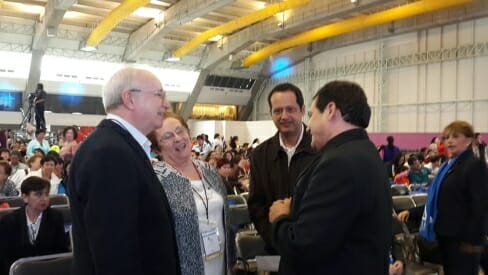 The first report was presented by Anna and Alberto Friso, members of the Pontifical Council for the Family, who examined the challenges to an institution that is more and more under attack due to the influence of individualism , but which remains as a light for society precisely because it is a “little church”. A variety of academics, civil leaders and members of the most prestigious institutions in the country, such as IMDOSOC, Mexicanos Primeros, A favor de lo mejor, México Evalúa and others, offered interesting presentations that helped to understand this North American country from many different angles: politics, mass media, education and social action. Among the testimonies there were also three aritsts of international fame: Liana Rebolledo, Eduardo Verástegui and Emmanuel. A very touching testimony was given by Margaret Karran, an Arab Christian focolarina from Haifa who up to a short time before had lived in the Holy Land in direct contact with the diverse religious expressions that are found there.
The first report was presented by Anna and Alberto Friso, members of the Pontifical Council for the Family, who examined the challenges to an institution that is more and more under attack due to the influence of individualism , but which remains as a light for society precisely because it is a “little church”. A variety of academics, civil leaders and members of the most prestigious institutions in the country, such as IMDOSOC, Mexicanos Primeros, A favor de lo mejor, México Evalúa and others, offered interesting presentations that helped to understand this North American country from many different angles: politics, mass media, education and social action. Among the testimonies there were also three aritsts of international fame: Liana Rebolledo, Eduardo Verástegui and Emmanuel. A very touching testimony was given by Margaret Karran, an Arab Christian focolarina from Haifa who up to a short time before had lived in the Holy Land in direct contact with the diverse religious expressions that are found there.

Margaret Karram (second from right)
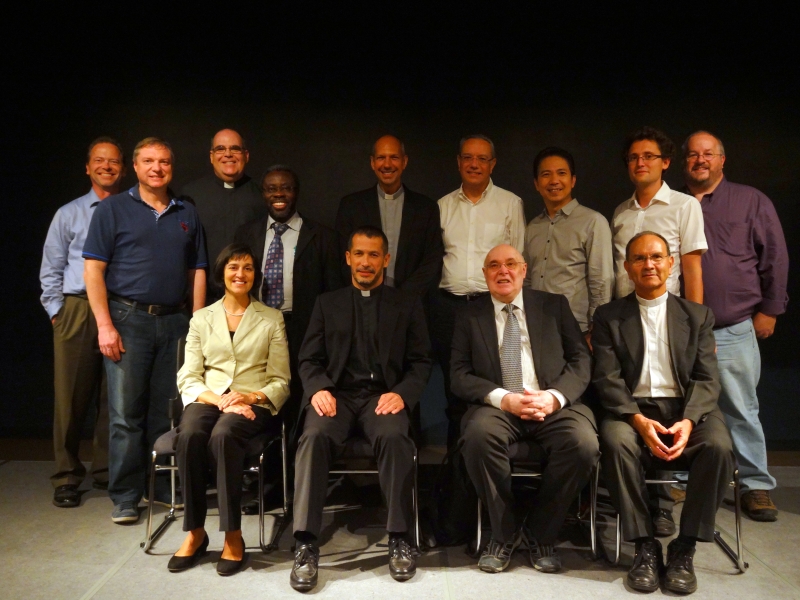
Oct 22, 2015 | Non categorizzato
 “The place of my dreams, ever since I was small, was Canada. I would certainly never have dreamed of actually going there, much less in a town called Saskatoon in the prairies of Saskatchewan. Even more beautiful was the reason that brought me there. I went to take part in the final session of the Consultation between the World Evangelical Alliance (WEA) and the Pontifical Council for Promoting Christian Unity of which I have been a member since 2009. I thought back over some experiences that were undertaken with Lutherans in South Brazil that followed a safe path. But with the first contact, I immediately realised that here it was another reality. I encountered a group of Evangelicals – in some countries they are called ‘Evangelists’, in others ‘Evangelicals’. There was a group of Christians included amongst them from different churches: Lutheran, Reformed, Baptist, Pentecostal, Mennonite and Anglican. They identified with a common missionary project, while living and being Church in very different ways from one another. There were thirteen of us – five Catholics and eight Evangelicals. I was the only lay person, and a woman. They came from Brazil, Canada, Colombia, Philippines, Germany, Guatemala, Italy, Kenya, Spain and the United States. It was an unforgettable week marked by prayer, study, reflection and, at times, heated discussions. The questions we asked helped us to know one another better, especially on a confessional and missionary level: What do we have in common? What still divides us? The diversity I encountered was a valuable enrichment and a serious challenge. Above all, we tried to clarify our positions in order to overcome the conflicts through truthful dialogue in charity. It wasn’t easy, and there wasn’t a lack of problems. We experienced the pain of the divisions. We realised that the road ahead would be long. What to do? Let it go, or carry on? Personally, I discovered that any obstacle can become an opportunity for dialogue and an invitation to have an even greater measure of love. We faced the problems in the light of the Gospel, working like real disciples of Christ. Amongst the Catholics were bishops, priests and laity; and we also came from different countries and backgrounds, different points of view. Yet, together, we managed to have a living experience of full and real communion which we enjoy. This is fraternal communion born over years together, along with the hope that every one of us can contribute something towards the reconciliation between Catholics and Evangelicals in our own country. Now, we are awaiting the publication of the final report of this Consultation. Because of the personal friendship established with them, Pope Francis has triggered a new ‘march’ of this dialogue. Encouraged by him, we would like to promote this experience everywhere, because it is in the local community that we live with one another; it is there that we forgive one another; and it is there that we offer the witness that Jesus asks us for: “By this everyone will know that you are my disciples, if you have love for one another” (Jn 13:35).
“The place of my dreams, ever since I was small, was Canada. I would certainly never have dreamed of actually going there, much less in a town called Saskatoon in the prairies of Saskatchewan. Even more beautiful was the reason that brought me there. I went to take part in the final session of the Consultation between the World Evangelical Alliance (WEA) and the Pontifical Council for Promoting Christian Unity of which I have been a member since 2009. I thought back over some experiences that were undertaken with Lutherans in South Brazil that followed a safe path. But with the first contact, I immediately realised that here it was another reality. I encountered a group of Evangelicals – in some countries they are called ‘Evangelists’, in others ‘Evangelicals’. There was a group of Christians included amongst them from different churches: Lutheran, Reformed, Baptist, Pentecostal, Mennonite and Anglican. They identified with a common missionary project, while living and being Church in very different ways from one another. There were thirteen of us – five Catholics and eight Evangelicals. I was the only lay person, and a woman. They came from Brazil, Canada, Colombia, Philippines, Germany, Guatemala, Italy, Kenya, Spain and the United States. It was an unforgettable week marked by prayer, study, reflection and, at times, heated discussions. The questions we asked helped us to know one another better, especially on a confessional and missionary level: What do we have in common? What still divides us? The diversity I encountered was a valuable enrichment and a serious challenge. Above all, we tried to clarify our positions in order to overcome the conflicts through truthful dialogue in charity. It wasn’t easy, and there wasn’t a lack of problems. We experienced the pain of the divisions. We realised that the road ahead would be long. What to do? Let it go, or carry on? Personally, I discovered that any obstacle can become an opportunity for dialogue and an invitation to have an even greater measure of love. We faced the problems in the light of the Gospel, working like real disciples of Christ. Amongst the Catholics were bishops, priests and laity; and we also came from different countries and backgrounds, different points of view. Yet, together, we managed to have a living experience of full and real communion which we enjoy. This is fraternal communion born over years together, along with the hope that every one of us can contribute something towards the reconciliation between Catholics and Evangelicals in our own country. Now, we are awaiting the publication of the final report of this Consultation. Because of the personal friendship established with them, Pope Francis has triggered a new ‘march’ of this dialogue. Encouraged by him, we would like to promote this experience everywhere, because it is in the local community that we live with one another; it is there that we forgive one another; and it is there that we offer the witness that Jesus asks us for: “By this everyone will know that you are my disciples, if you have love for one another” (Jn 13:35).
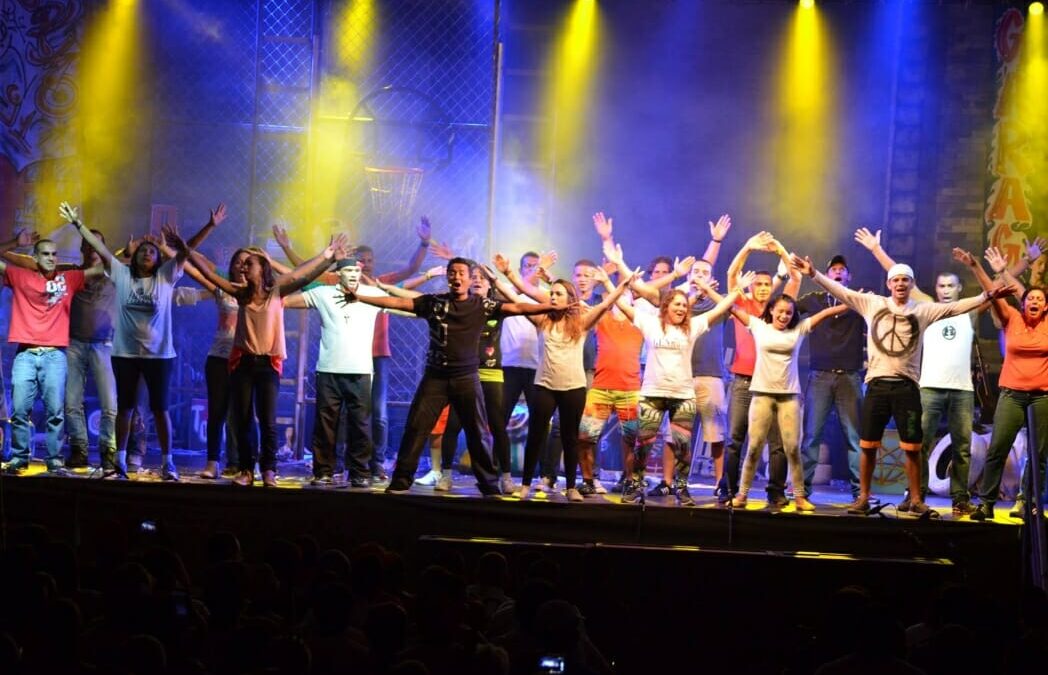
Oct 21, 2015 | Non categorizzato
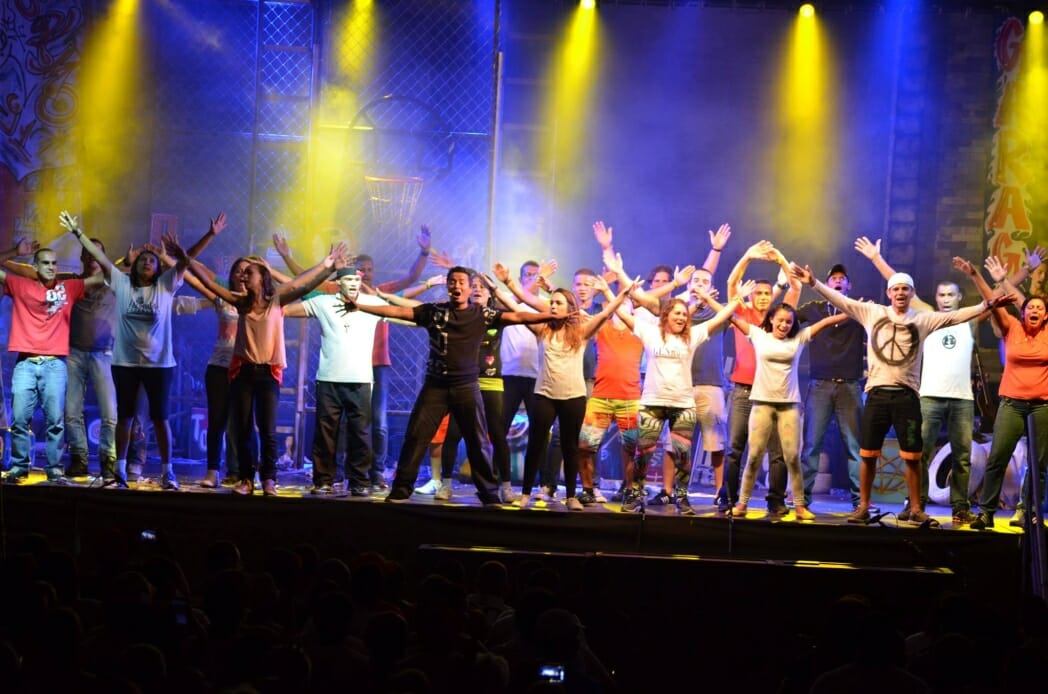 These are the figures of Gen Rosso’s tour in Brazil: the band that resides in Loppiano has undertaken seven projects – one for every city – in collaboration with Fazenda da Esperança – a community founded in 1983 by Frei Hans, Nelson, Lucy and Iraçi – and the prefecture of Guarapuava. The first city to host the band was Palmas, in the state of Tocantins where the Fazenda da Esperança hosts 25 youths under rehab programmes from drugs, alcohol and violence, and who will work with Gen Rosso – together with other youths of other 4 Fazende in neighbouring cities – and take part of an intense workshop through which they will not only stage their musical Streetlight, but also undertake a spiritual journey of communion. Also 170 youths of the Focolare Movement of various parishes and diocesan movements will participate in the nine artistic workshops. The two evening shows resulting from the workshops attracted an audience of 2,300 people, as well as the national TV Globo channel, other media and the local civil and religious authorities. Also the second third stopover in Caxias and Manaus, in the states of Maranhão and the Amazon, followed the same pattern: the spirit of the tour is to involve the youth, especially those with difficult backgrounds and vicissitudes, within a programme of education towards peace and a different lifestyle transmitted through music, dance and mutual sharing. There were numerous touching testimonials in this sense: «I have lived for two years in the square of the theatre, sleeping on that bench in front, and ate what I found in the trashcans… I never thought that I would one day see what was behind those doors, and even go onstage to express my wish for redemption and a new life,» a boy from Manaus said. «I was familiar with the backstage door. I would enter to steal and when it was closed, it was the corner where I would assume drugs . And now, here I am, trying to give the best of myself: life is marvelous!» another boy relayed. Also the audience wrote very meaningful impressions – the final celebrations in Manaus saw the participation of 6,000 people – among these, the Bishop of Caxias, who underlined how «this type of evangelisation goes directly to the hearts of the youth, and from the stage reaches out to the public in an unmistakable and exciting way, » and various journalists gave ample reportages and footage in their various newspapers and TV channels. The tour is under way and will bring the band to Garanhuns (Pernambuco), Casca (Rio Grande do Sul), Guaratinguetá (San Paolo)
These are the figures of Gen Rosso’s tour in Brazil: the band that resides in Loppiano has undertaken seven projects – one for every city – in collaboration with Fazenda da Esperança – a community founded in 1983 by Frei Hans, Nelson, Lucy and Iraçi – and the prefecture of Guarapuava. The first city to host the band was Palmas, in the state of Tocantins where the Fazenda da Esperança hosts 25 youths under rehab programmes from drugs, alcohol and violence, and who will work with Gen Rosso – together with other youths of other 4 Fazende in neighbouring cities – and take part of an intense workshop through which they will not only stage their musical Streetlight, but also undertake a spiritual journey of communion. Also 170 youths of the Focolare Movement of various parishes and diocesan movements will participate in the nine artistic workshops. The two evening shows resulting from the workshops attracted an audience of 2,300 people, as well as the national TV Globo channel, other media and the local civil and religious authorities. Also the second third stopover in Caxias and Manaus, in the states of Maranhão and the Amazon, followed the same pattern: the spirit of the tour is to involve the youth, especially those with difficult backgrounds and vicissitudes, within a programme of education towards peace and a different lifestyle transmitted through music, dance and mutual sharing. There were numerous touching testimonials in this sense: «I have lived for two years in the square of the theatre, sleeping on that bench in front, and ate what I found in the trashcans… I never thought that I would one day see what was behind those doors, and even go onstage to express my wish for redemption and a new life,» a boy from Manaus said. «I was familiar with the backstage door. I would enter to steal and when it was closed, it was the corner where I would assume drugs . And now, here I am, trying to give the best of myself: life is marvelous!» another boy relayed. Also the audience wrote very meaningful impressions – the final celebrations in Manaus saw the participation of 6,000 people – among these, the Bishop of Caxias, who underlined how «this type of evangelisation goes directly to the hearts of the youth, and from the stage reaches out to the public in an unmistakable and exciting way, » and various journalists gave ample reportages and footage in their various newspapers and TV channels. The tour is under way and will bring the band to Garanhuns (Pernambuco), Casca (Rio Grande do Sul), Guaratinguetá (San Paolo)
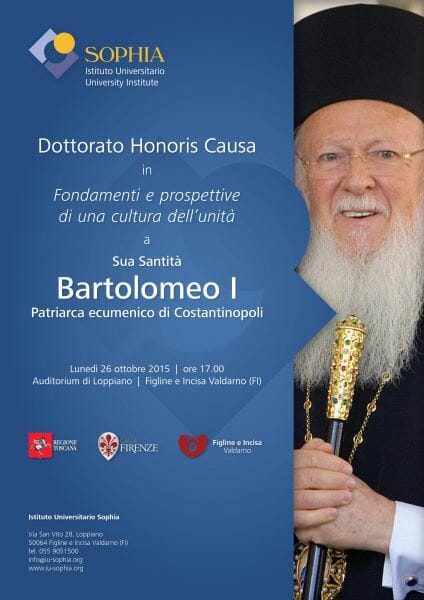
Oct 20, 2015 | Non categorizzato
 On October 26, 2015, at 5.00 pm
His Holiness Bartholomew I, Ecumenical Patriarch of Constantinople will be receiving the first honory doctoral degree in the culture of unity conferred by the Sophia University Institute, situated in Loppiano (Florence) and founded by Chiara Lubich to deal competently and effectively with the cultural transition taking place. The ceremony will be held on October 26 at 17.00 hrs at the Auditorium of the international Centre of the Focolare.The Patriarch, a pioneer in ecumenical dialogue and a peacemaker, is a point of reference in the complex contemporary scene. During some recent important historical events, he stood out for his leading role in promoting unity on several fronts. On May 25, 2014, at the end of the pilgrimage to Jerusalem, he joined Pope Francis in signing a declaration to confirm their respective churches’ commitment “towards unity for which Christ, our Lord prayed to the Father so ‘that all may be one’”. On June 8, 2014 he was at the Vatican together with President Mahmoud Abbas and President Shimon Peres to pray with the Pope for peace in the Holy Land. Bartholomew I is known for his spiritual environmental leadership.His teachings on the environment have been widely quoted by Pope Francis in his encyclical “Laudato si”. The Patriarch has been invited to address the assembly during the ecumenical service at Notre Dame Cathedral on December 3, at the time when the United Nations Climate Change Conference will be taking place in Paris.
The theologian Piero Coda, President of the University Institute said: “Today, the world needs people who seek the unity of the human family, and the Patriarch is constantly rendering a valuable service towards a culture that aims at placing fraternity at the heart of human history”. The recommendation specifies that: “The Ecumenical Patriarch of Constantinople is accredited for his active leading role in the ecumenical journey towards full Christian unity and in the dialogue with people of different beliefs and religions. He distinguishes himself for promoting justice, peace and protection of the environment, in conformity with the vision on humanity, history and the universe, that comes from the treasured spiritual and theological Eastern Orthodox Christian tradition”.
The Ecumenical Patriarch of Constantinople and the Focolare Movement – It all began with a meeting between Patriarch Athenagoras I and Chiara Lubich. “It was June 13, 1967”‐Lubich related‐ “The Patriarch welcomed me as if he had always known me and he asked me about the Movement’s contacts with the Lutherans and the Anglicans”. Between 1967 and 1972, Athenagoras met the founder of the Focolare Movement 23 times, and thus she became the messenger between Pope Paul VI and the Patriarch. This relationship continued with his successor, Demetrio I. Contacts with the current Ecumenical Patriarch Bartholomew I continue in the same spirit of spiritual friendship. His Holiness Bartholomew I, who visited Chiara Lubich at the Gemelli hospital a few days before her passing away on March 14, 2008 said: “I wanted to come here to give my personal greetings and those of the Ecumenical Patriarchate of Constantinople to dearest Chiara, who, through her life, has given and gives so much to the Church.I gave her my blessing with gratitude. I am happy to have met her.” Two years later, when he welcomed Maria Voce, the newly elected president of the Focolare Movement at the Phanar, he said “ I thank God for your friendship, your visit, the fruits of your Movement, and for the continuation of this work of God that gives glory to His name”.
This event takes place when Loppiano celebrates the first 50 years of its foundation, and it continues to strengthen the relationship of esteem and collaboration between the Patriarchate of Constantinople and the Focolare Movement.
On October 26, 2015, at 5.00 pm
His Holiness Bartholomew I, Ecumenical Patriarch of Constantinople will be receiving the first honory doctoral degree in the culture of unity conferred by the Sophia University Institute, situated in Loppiano (Florence) and founded by Chiara Lubich to deal competently and effectively with the cultural transition taking place. The ceremony will be held on October 26 at 17.00 hrs at the Auditorium of the international Centre of the Focolare.The Patriarch, a pioneer in ecumenical dialogue and a peacemaker, is a point of reference in the complex contemporary scene. During some recent important historical events, he stood out for his leading role in promoting unity on several fronts. On May 25, 2014, at the end of the pilgrimage to Jerusalem, he joined Pope Francis in signing a declaration to confirm their respective churches’ commitment “towards unity for which Christ, our Lord prayed to the Father so ‘that all may be one’”. On June 8, 2014 he was at the Vatican together with President Mahmoud Abbas and President Shimon Peres to pray with the Pope for peace in the Holy Land. Bartholomew I is known for his spiritual environmental leadership.His teachings on the environment have been widely quoted by Pope Francis in his encyclical “Laudato si”. The Patriarch has been invited to address the assembly during the ecumenical service at Notre Dame Cathedral on December 3, at the time when the United Nations Climate Change Conference will be taking place in Paris.
The theologian Piero Coda, President of the University Institute said: “Today, the world needs people who seek the unity of the human family, and the Patriarch is constantly rendering a valuable service towards a culture that aims at placing fraternity at the heart of human history”. The recommendation specifies that: “The Ecumenical Patriarch of Constantinople is accredited for his active leading role in the ecumenical journey towards full Christian unity and in the dialogue with people of different beliefs and religions. He distinguishes himself for promoting justice, peace and protection of the environment, in conformity with the vision on humanity, history and the universe, that comes from the treasured spiritual and theological Eastern Orthodox Christian tradition”.
The Ecumenical Patriarch of Constantinople and the Focolare Movement – It all began with a meeting between Patriarch Athenagoras I and Chiara Lubich. “It was June 13, 1967”‐Lubich related‐ “The Patriarch welcomed me as if he had always known me and he asked me about the Movement’s contacts with the Lutherans and the Anglicans”. Between 1967 and 1972, Athenagoras met the founder of the Focolare Movement 23 times, and thus she became the messenger between Pope Paul VI and the Patriarch. This relationship continued with his successor, Demetrio I. Contacts with the current Ecumenical Patriarch Bartholomew I continue in the same spirit of spiritual friendship. His Holiness Bartholomew I, who visited Chiara Lubich at the Gemelli hospital a few days before her passing away on March 14, 2008 said: “I wanted to come here to give my personal greetings and those of the Ecumenical Patriarchate of Constantinople to dearest Chiara, who, through her life, has given and gives so much to the Church.I gave her my blessing with gratitude. I am happy to have met her.” Two years later, when he welcomed Maria Voce, the newly elected president of the Focolare Movement at the Phanar, he said “ I thank God for your friendship, your visit, the fruits of your Movement, and for the continuation of this work of God that gives glory to His name”.
This event takes place when Loppiano celebrates the first 50 years of its foundation, and it continues to strengthen the relationship of esteem and collaboration between the Patriarchate of Constantinople and the Focolare Movement.
Source: Press Release 19 October 2015 Other material available at Focolare Information Service Bartholomew I – Biographical Profile Sophia University Institute – Dossier “Athenagoras I, Paul VI and Chiara Lubich” – video (available in high definition, please send your request to sif.press@focolare.org) Photo gallery
Oct 20, 2015 | Focolare Worldwide
http://vimeo.com/95726085 Jerusalem, May 24th: the encounter with Pope Francis and Patriarch Bartholomew recalls the historic embrace of 50 years ago between Paul VI and the Ecumenical Patriarch of Constantinople, Athenagoras I, which was the start of a new page in history following centuries of separation. We retrace this unedited page in the history of ecumenical dialogue.
Oct 19, 2015 | Non categorizzato
This is the title that has been chosen for the 9th UNESCO Youth Forum, which preceeds the UNESCO General Conference. Nancy Nanjala (Kenya) and Danilo Gomes (Brazil) will attend the Forum, representing the youth of the New Humanity NGO, which represents the Focolare Movement in international organisations. The event will be held at the UNESCO headquarters in Paris, on October 26–28, 2015.

 “It was the Son of God, Jesus Christ who revealed to us the true image of God and the true image of man and woman. God is Father, Son and Holy Spirit. We are, therefore, not dealing with three gods but one God in three Persons, as lengthily described in the doctrine of the Trinity. The Church has deepened and preserved this doctrine in all its integrity throughout the centuries. Besides finding the correct language in its profession of faith, the Church has always adored the Three Divine Persons. Up to the present, the spiritual Trinitarian doctrine has shown us the deep relationship the disciples of Jesus had with each of these Three Divine Persons. The Word of God does not present God only as a perfect Spirit, creator of heaven and earth, (as declared in the Christian Doctrine’s Second Catechism), but affirms that “God is love” (1 John 4,8.16). Saint Augustine tried to delve deeper into the path of love in God and reached the point of affirming that God is the Lover, the Beloved, and Love itself. However, he felt incapable of pursuing this path and bequeathed to us the deepening of this mystery in man and woman, in the three qualities of intelligence, memory and will. But what remained to be fully developed was the deeper understanding of the mystery of God who is Love. In our time, in which culture affirms the individual up to the point of falling into an exasperated individualism, and we struggle to make the synthesis between unity and diversity in the human relationships in this globalised world where human relationships are still re-evaluated in all senses, it would be opportune to seek in the Holy Trinity, that essentially Christian foundation, the path towards the fulfillment of love as a human identity. What is love? How can we understand and experience love? Our pathway must be found in the pathway of He who came to us from the womb of the Father, that is, the Son. To meet man, God who is love made himself nothing (Nazareth, Maria, Joseph, Bethlehem, the flight to Egypt. The Cross) (cfr text of Paul to the Philppians 2,5-11). Love passes through the incarnation and the mystery of the resurrection. Love makes itself nothing to be able to meet the other. This is the Kenotic dimension of love. Without this path it would be difficult for man and woman to find that relationship with God, but also with each other, whether man or woman. In this sense I think we could find the Trinitarian path of anthropology, not only theoretically but concretely.”
“It was the Son of God, Jesus Christ who revealed to us the true image of God and the true image of man and woman. God is Father, Son and Holy Spirit. We are, therefore, not dealing with three gods but one God in three Persons, as lengthily described in the doctrine of the Trinity. The Church has deepened and preserved this doctrine in all its integrity throughout the centuries. Besides finding the correct language in its profession of faith, the Church has always adored the Three Divine Persons. Up to the present, the spiritual Trinitarian doctrine has shown us the deep relationship the disciples of Jesus had with each of these Three Divine Persons. The Word of God does not present God only as a perfect Spirit, creator of heaven and earth, (as declared in the Christian Doctrine’s Second Catechism), but affirms that “God is love” (1 John 4,8.16). Saint Augustine tried to delve deeper into the path of love in God and reached the point of affirming that God is the Lover, the Beloved, and Love itself. However, he felt incapable of pursuing this path and bequeathed to us the deepening of this mystery in man and woman, in the three qualities of intelligence, memory and will. But what remained to be fully developed was the deeper understanding of the mystery of God who is Love. In our time, in which culture affirms the individual up to the point of falling into an exasperated individualism, and we struggle to make the synthesis between unity and diversity in the human relationships in this globalised world where human relationships are still re-evaluated in all senses, it would be opportune to seek in the Holy Trinity, that essentially Christian foundation, the path towards the fulfillment of love as a human identity. What is love? How can we understand and experience love? Our pathway must be found in the pathway of He who came to us from the womb of the Father, that is, the Son. To meet man, God who is love made himself nothing (Nazareth, Maria, Joseph, Bethlehem, the flight to Egypt. The Cross) (cfr text of Paul to the Philppians 2,5-11). Love passes through the incarnation and the mystery of the resurrection. Love makes itself nothing to be able to meet the other. This is the Kenotic dimension of love. Without this path it would be difficult for man and woman to find that relationship with God, but also with each other, whether man or woman. In this sense I think we could find the Trinitarian path of anthropology, not only theoretically but concretely.” 



 “I live in Nicosia and was born and grew up in an Orthodox family that was Christian in name only. There was no depth, no relationship with Jesus. Indeed, God was the ally of my parents, and they seemed to have a monopoly on Him when they wanted us to obey them. When I finished high school, I received a scholarship to study orthodontics in Hungary. It was difficult for me to get used to the new sitaution. For the first time I was far from my family, living with people I didn’t know. Back then, we were far from the multicultural spirit that prevails today. I was filled with prejudices, with an attitude of rejection. During that year I encountered many disappointments, also from my friends. Meanwhile, the deep search for a more authentic life had begun in me. At the new college I met a
“I live in Nicosia and was born and grew up in an Orthodox family that was Christian in name only. There was no depth, no relationship with Jesus. Indeed, God was the ally of my parents, and they seemed to have a monopoly on Him when they wanted us to obey them. When I finished high school, I received a scholarship to study orthodontics in Hungary. It was difficult for me to get used to the new sitaution. For the first time I was far from my family, living with people I didn’t know. Back then, we were far from the multicultural spirit that prevails today. I was filled with prejudices, with an attitude of rejection. During that year I encountered many disappointments, also from my friends. Meanwhile, the deep search for a more authentic life had begun in me. At the new college I met a 





